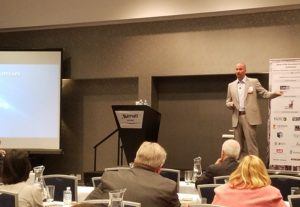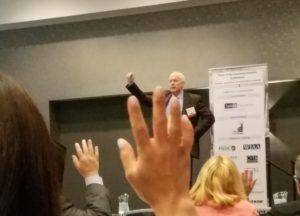“If we survive the next five to 10 years and improve the way we do things, we can be well-positioned into the future.”
James Keating, founder, chairman and CEO of The Keating Group, offered those positive words amid the din of voices calling attention to the dangers of disruption in the insurance industry.
Keating spoke to a crowd of insurance professionals on Thursday at the Western Insurance Agents Association (WIAA) state of the industry conference in Irvine, Calif. Other featured speakers at the conference included George Muller, deputy commissioner of enforcement for the California Department of Insurance; Beth Ossino, claims manager for Golden Bear Insurance Co.; Joel Laucher, chief deputy at the CDI, and John Finston, CDI’s general counsel.
Keating was one of a handful of speakers who focused on technology and industry disruption.
The Keating Group is a holding company for Keating Cos., tKg Wholesale Brokerage, tKg Online, WholeSource and Keating Capital.
The forty-something executive has gone a long way in a short time building out these firms, as evidenced by the story of his firm’s growth he told at the conference. In 2004 he drove from Phoenix, Ariz. to Boston, Mass. to make a start in the insurance business armed only with his knowledge and a $75,000 bank account.

By the end of that year he was in four markets, had 516 submissions and $3.8 million in written premium.
“I remember telling my grandma, ‘If I could just get to $10 million in premium, I’d be happy,'” Keating said.
As of 2016, the firm was in 172 markets, had 45,000 submissions and $181 million in written premium. He estimates the firm’s market value is between $45 and $55 million.
He juxtaposed that value with the value that the independent agency holds for the business world and society in general.
“The independent agency, in my opinion, is one of the most valuable parts of the American economy,” he said.
However, independent agencies must embrace technology to compete with large concerns and disruptors, he said.
One way he suggested they can compete with large companies and well-funded startups coming into the industry is to invest heavily in technology.
Between 2004 and 2009 his firm grew by $8.7 million, and then between 2010 and 2016 it grew by $52.7 million, according to Keating. He measured the proportion of that growth by a ratio of his spend on technology in those same periods. Keating’s IT investment from 2004 to 2009 was $1.4 million. Starting in 2010 up to last year that investment rose to $6.1 million.
“You’ve got to invest in technology,” he said.
Richard Kerr, chairman and CEO of Dallas, Texas-based electronic insurance exchange MarketScout Corp., hammered a common thread throughout the speaker presentations: Insuretech.
Like Keating, Kerr encouraged agency owners and managers in the audience to take note of the growth of insuretech and to look for ways to adapt to a changing industry by setting themselves up to deliver specific services at an expert level. “You are safe if you are a specialist,” Kerr said. “If you’re doing a very generic, mainstream business, you need to be worried.”
In his examples he referred to disruptors like Zenefits, Lemonade and Attune. The latter is a technology-enabled platform targeted at the small to medium commercial insurance market that was created in partnership by Hamilton Insurance Group, American International Group Inc. and affiliates of Two Sigma Investments LP.

Operators like these are all using big data to increasingly move toward selling insurance online to small businesses, he said.
A company like Attune, Kerr said, only needs two things from a small business to offer it insurance: its name and its address.
“Because every other dataset they need is out there,” he said.
Michael Jans, founder and CEO of Agency Revolution, produced a dizzying array of statistics to drive home his point about the need for agencies to be on board with investing in better technology.
- 81 percent of consumers research online before shopping
- 65 percent of consumers read between four and 52 online reviews
- 98 percent of people check email at least once a day
- 39 percent of people check their email 10 times or more a day
- 87 percent of people say they check their email between midnight and 5 a.m. at least once a week
- The average person touches, taps or swipes their smartphones roughly 2,617 times in a day
“In our business, if we want to reach people and touch people, we have to be where they are,” Jans said.
Other figures in his online-focused talk included tidbits like: mobile web searches surpassed desktop searches more than two years ago; people spend an average of 87 hours per month browsing on their smartphones; and 44 percent of people in a recent poll said they have had zero interactions with their insurance agent in the last 18 months.
Meanwhile insuretech startups are finding more ways to reach consumers and make it more convenient for them to buy insurance online, according to Jans, who said he’s seen an increase in venture capital, conferences and media focused on insuretech.
Jans did some research to see how many insuretech-themed conferences are planned for the near future. “I counted 20,” he said. “It’s an industry and it’s right next to us and it will disrupt us.”
Flinstsones
Insuretech and the insurance industry can best be thought of like the Jetsons and the Flintstones, according to Bill Hartnett, founder and president of Hartnett Advisors, a firm that offers strategic advice on technology usage.
“The (insurance) business model goes back to Lloyd’s, which is just over 300 years old,” he said. “It really hasn’t changed materially since then.”
Hartnett not surprisingly cautioned those listening to embrace technology and use it to their advantage, including considering tapping into big data.
“All the data up through history, we’ll double that this year,” he said.
Hartnett tackled an array of related topics in his talk, from autonomous vehicles to the Internet of Things to cognitive computing. All of which are going to change the way insurance is sold, he said.
“The factory of the future is going to be a man and a dog,” he said. “It will be the man’s job to feed the dog, and it will be the dog’s job to make sure the man doesn’t touch anything.”
Related:
Was this article valuable?
Here are more articles you may enjoy.



 Chubb Posts Record Q4 and Full Year P/C Underwriting Income, Combined Ratio
Chubb Posts Record Q4 and Full Year P/C Underwriting Income, Combined Ratio  Allstate CEO Wilson Takes on Affordability Issue During Earnings Call
Allstate CEO Wilson Takes on Affordability Issue During Earnings Call  US Appeals Court Rejects Challenge to Trump’s Efforts to Ban DEI
US Appeals Court Rejects Challenge to Trump’s Efforts to Ban DEI  AIG, Chubb Can’t Use ‘Bump-Up’ Provision in D&O Policy to Avoid Coverage
AIG, Chubb Can’t Use ‘Bump-Up’ Provision in D&O Policy to Avoid Coverage 

